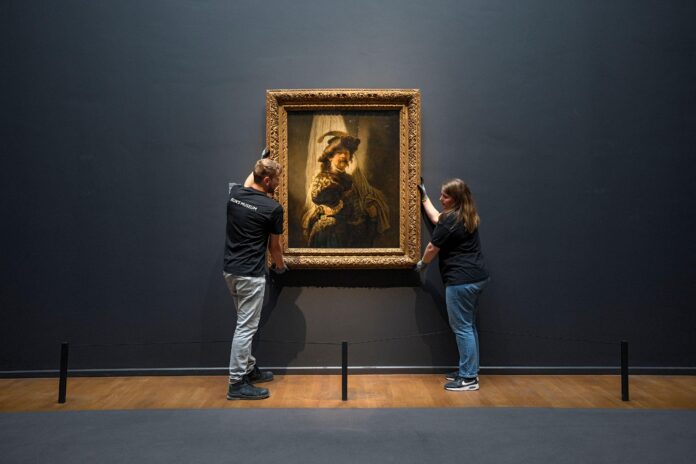Rembrandt’s The Standard Bearer (1636) was unveiled at the Rijksmuseum today after a nation-wide tour following its government-backed acquisition for €175m last year. The museum will lift entrance fees on Saturday, 17 June, to mark the occasion.
Created when the Dutch 17th-century artist had just turned 30, The Standard Bearer is one of the first paintings that Rembrandt made after he established himself as an independent artist in Amsterdam.
The painting is considered the final major work by Rembrandt to enter a public museum from private owners. The painting’s owners have ranged from the UK monarch King George IV to one of the French Rothschilds, from whom the painting was bought.
The work was acquired by the Amsterdam museum thanks to a grant of €150m from the Dutch government. Further contributions were made by the Rembrandt Association, which contributed €15m, and the Rijksmuseum Fund, which contributed €10m.
The Standard Bearer depicts the eponymous soldier who was positioned at the front of Dutch troops in the Eighty Years’ War, the war of independence which led to the birth of the Netherlands in 1648. A self-portrait, the painting shows Rembrandt, in historical clothing, in the role of standard bearer, a clear assertion on his place in art history.
At the same time, The Standard Bearer shows Rembrandt’s ambition to paint a group portrait for the Amsterdam militia, at the time the most valued commission a painter could be awarded. Rembrandt succeeded six years later when he was commissioned to paint The Night Watch. The two paintings will now hang alongside each other in the Rijksmuseum.
Rembrandt made around 340 paintings, most of which are in foreign museums and private collections. In the Netherlands, there are 44 paintings by Rembrandt, 22 are in the Rijksmuseum.
Although the Dutch Senate approved the acquisition last year, some senators voiced their concerns at the time, pointing to its owners’ connections to tax havens and the timing of the purchase during the pandemic.
As a result, the painting first went on a tour of the Dutch regions before being hung in the Rijksmuseum. According to a spokesperson from the Rijksmuseum, “The tour enabled everyone in the Netherlands to see this masterpiece, without having to travel far. In every province at least one day the entry to the museum displaying The Standard Bearer was free. Therefore, everyone could see the painting for free as well.”

























